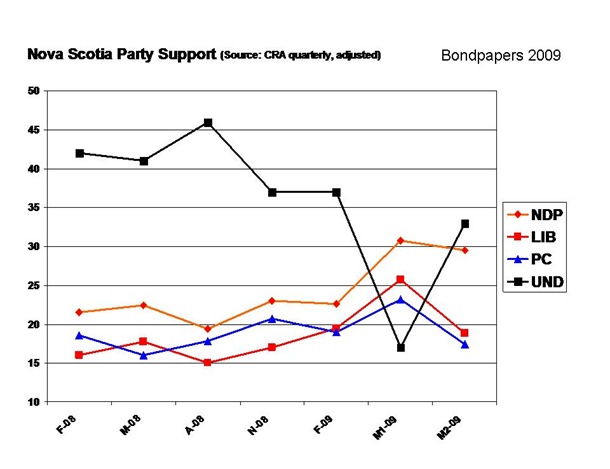Take a look at the Corporate Research Associates quarterly poll results since early 2008, adjust them to take out the “percentage of decideds” skew and it’s pretty clear that no political party in Nova Scotia is lighting anyone on fire.

There’s what you get and it really isn’t pretty.
With the exception of the poll taken in the first two weeks of May 2009, “undecided” more Nova Scotians are undecided than are opting for any one of the three major political parties.
The New Democrats may wind up on top in next week’s vote, but that’s just the way the electoral system works. It sure won’t be because there is any massive excitement among Nova Scotians for an orange option. Blue and Red are in worse shape.
Leadership certainly isn’t a factor. Sure, CRA asks which leader Nova Scotians prefer and sure the NDP guy comes out on top.
But when asked to rank the issues, leadership comes out as the big issue for a mere five percent of respondents in the poll done in the second half of May.
According to that poll, the top issues are health care funding (37%) and dealing with economic concerns (33%). The next most frequently mentioned issue - education funding – comes in at a mere 11%.
That’s interesting because the NDP are pushing Darrel Dexter above all in what has become a fairly typical “Big Giant Head” type of campaign. But - stealing an approach from the federal Conservatives - the Nova Scotia New Democrats are making seven key commitments. The top two are the economy and health care. Stephen Harper only needed five commitments, incidentally.
Ditto the Liberals, at least as far as making the party leader the centrepiece. That’s a weird choice given that the guy doesn’t poll all that well in comparison to others and – if CRA is correct – the leader ain’t the vote driver. The Nova Scotia Grits also have seven ideas at the heart of their plan, the second and third of which are health care and the economy.
The Nova Scotia Progressive Conservatives are in trouble. Google the party and the information that comes back claims the party is led by some guy named Hamm. If the party website can’t get any more up-to-date, then there are issues here that help explain the Tory’s consistently crappy polling and why they are likely to be headed for the opposition benches for a while.
The Progressive Conservatives play down their leader a bit – hint: it ain’t Hamm - which is understandable if the polling is right. The party platform has five core areas and the top one is the economy. The second one is also the economy, expressed as “rural development”. The third and forth are about crime and “defending” Nova Scotia while the fifth is another traditional Nova Scotia economic engine: the political pork feast of roads and infrastructure.
If you look at all three parties, neither of them is really hammering away at health issues or the economy, at least as far as their news releases are concerned.
For an outsider watching the election from afar, media coverage wouldn’t suggest the election is a hot topic. Take a gander at the Chronicle Herald website and find any highlight of election coverage. Try and find it. CBC has the standard [Insert the name of the jurisdiction here] Votes [Insert Year Here] but the web space is nothing to write home about. those are just two. The actual on-air coverage from the electronics, plus Connie TV’s Steve Murphy or Global might be different.
Something suggests, though, that the election isn’t turning anybody’s crank in a big way.
That, rather than the idea the New Democrats will be the government, might turn out to be the story next week: “Nova Scotia had an election and they swapped one minority government for another; see you again in a year or so.”